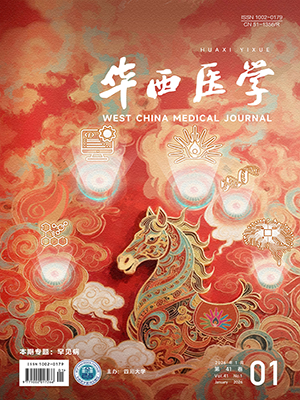| 1. |
Aprile I, Di Stasio E, Romitelli F, et al. Effects of rehabilitation on quality of life in patients with chronic stroke. Brain Injury, 2008, 22(6): 451-456.
|
| 2. |
曲艷吉, 卓琳, 詹思延. 中國腦卒中后認知障礙流行病學特征的系統評價. 中華老年心腦血管病雜志, 2013, 15(12): 1294-1301.
|
| 3. |
Pendlebury ST. Prevalence, incidence, and factors associated with pre-stroke and post-stroke dementia: a systematic review and meta-analysis. Lancet Neurol, 2009, 8(11): 1006-1018.
|
| 4. |
Pendlebury ST. Dementia in patients hospitalized with stroke: rates, time course, and clinico-pathologic factors. Int J Stroke, 2012, 7(7): 570-581.
|
| 5. |
Saban KL, Sherwood PR, Devon HA, et al. Measures of psychological stress and physical health in family caregivers of stroke survivors: a literature review. J Neurosci Nurs, 2010, 42(3): 128-138.
|
| 6. |
解恒革. 認知損害應成為卒中后綜合管理的重點. 內科雜志, 2017, 56(2): 89-91.
|
| 7. |
都天慧, 屈云. 遠程康復在腦卒中后患者康復中的應用及發展. 中華物理醫學與康復雜志, 2016, 38(12): 955-957.
|
| 8. |
王陽秭, 李鴻艷, 馮瓊, 等. 遠程康復在腦卒中康復中的應用進展. 中國康復醫學雜志, 2019, 34(10): 1241-1244.
|
| 9. |
Appleby E, Gill ST, Hayes LK, et al. Effectiveness of telerehabilitation in the management of adults with stroke: a systematic review. PLoS One, 2019, 14(11): e0225150.
|
| 10. |
Brennan DM, Mawson S. Telerehabilitation: enabling the remote delivery of healthcare, rehabilitation, and self management. Stud Health Technol Inform, 2009, 145: 231-248.
|
| 11. |
Cruz VT, Pais J, Bento V, et al. A rehabilitation tool designed for intensive web-based cognitive training: description and usability study. JMIR Res Protoc, 2013, 2(2): e59.
|
| 12. |
竇祖林, 文偉光, 譚聲輝, 等. 認知障礙的遠程康復進展. 中華物理醫學與康復雜志, 2003, 25(9): 568-571.
|
| 13. |
Tam SF, Man WK, Hui-Chan CW, et al. Evaluating efficacy of tele-cognitive rehabilitation for functional performance in three case studies. Occup Ther Inter, 2003, 10(1): 20-38.
|
| 14. |
Saywell N, Vandal AC, Brown P, et al. Telerehabilitation to improve outcomes for people with stroke: study protocol for a randomised controlled trial. Trials, 2012, 13: 233.
|
| 15. |
Langan J, Delave K, Phillips L, et al. Home-based telerehabilitation shows improved upper limb function in adults with chonic stroke: a pilot study. J Rehabil Med, 2013, 45(2): 217-220.
|
| 16. |
譚聲輝, 宋元良, 文偉光, 等. 電腦輔助及遠程認知康復的發展與應用. 中華物理醫學與康復雜志, 2003, 25(9): 572-573.
|
| 17. |
陸小鋒, 裴棟彬, 賈杰, 等. 腦卒中患者康復治療遠程智能監測平臺的設計. 中國康復醫學雜志, 2015, 30(10): 1049-1052.
|
| 18. |
Halbert K, Bautista C. Telehealth use to promote quality outcomes and reduce costs in stroke care. Crit Care Nurs Clin North Am, 2019, 31(2): 133-139.
|
| 19. |
鐘小燕, 白晶, 羅榮. 我國“互聯網+醫療”服務模式. 中國衛生事業管理, 2019, 36(1): 20-22, 28.
|
| 20. |
Mansbach WE, Mace RA. The efficacy of a computer-assisted cognitive rehabilitation program for patients with mild cognitive deficits: a pilot study. Exp Aging Res, 2017, 43(1): 94-104.
|
| 21. |
De Luca R, Calabrò RS, Gervasi G, et al. Is computer-assisted training effective in improving rehabilitative outcomes after brain injury? A case-control hospital-based study. Disabil Health J, 2014, 7(3): 356-360.
|
| 22. |
Navarro MD, Lloréns R, Noé E, et al. Validation of a low-cost virtual reality system for training street-crossing. A comparative study in healthy, neglected and non-neglected stroke individuals. Neuropsychol Rehabil, 2013, 23(4): 597-618.
|
| 23. |
De Luca R, Leonardi S, Spadaro L, et al. Improving cognitive function in patients with stroke: can computerized training be the future?. J Stroke Cerebrovasc Dis, 2018, 27(4): 1055-1060.
|
| 24. |
Mandonnet E. Understanding entangled cerebral networks: a prerequisite for restoring brain function with brain-computer interfaces. Front Syst Neurosci, 2014, 8: 82.
|
| 25. |
Torrisi M, Maresca G, De CM, et al. Using telerehabilitation to improve cognitive function in post-stroke survivors: is this the time for the continuity of care?. Int J Rehab Res, 2019, 42(4): 344-351.
|
| 26. |
Zeng N, Pope Z, Lee JE. Virtual reality exercise for anxiety and depression: a preliminary review of current research in an emerging field. J Clin Med, 2018, 7(3): E42.
|
| 27. |
閆婷婷, 鄭蔚. 人工智能技術在孤獨癥譜系障礙兒童認知及社會功能康復中的應用進展. 中國康復醫學雜志, 2019, 34(8): 994-998.
|
| 28. |
李思奇, 趙依雙, 張玉梅. 人工智能在腦卒中后認知障礙評定與康復中的應用. 中國醫刊, 2019, 54(10): 1066-1070.
|
| 29. |
劉銳芬, 周晶, 曾慶, 等. 計算機輔助認知訓練對腦卒中后認知障礙的效果. 廣東醫學, 2019, 40(10): 1401-1404.
|
| 30. |
胡艷群, 張立力, 鐘薇, 等. 自適應認知訓練對非癡呆型血管性認知障礙患者認知能力和生活質量的影響. 海南醫學, 2017, 28(16): 2624-2627.
|
| 31. |
Oliver M, Teruel M, Molina JP, et al. Ambient intelligence environment for home cognitive telerehabilitation. Sensors (Basel), 2018, 18(11): E3671.
|
| 32. |
Chen Y, Chen Y, Zheng K, et al. A qualitative study on user acceptance of a home-based stroke telerehabilitation system. Top Stroke Rehabil, 2020, 27(2): 81-92.
|
| 33. |
Fredrickson J, Maruff P, Woodward M, et al. Evaluation of the usability of a brief computerized cognitive screening test in older people for epidemiological studies. Neuroepidemiology, 2010, 34(2): 65-75.
|
| 34. |
Holliday SL, Navarrete MG, Hermosillo-Romo D, et al. Validating a computerized neuropsychological test battery for mixed ethnic lupus patients. Lupus, 2003, 12(9): 697-703.
|
| 35. |
van de Ven RM, Schmand B, Groet E, et al. The effect of computer-based cognitive flexibility training on recovery of executive function after stroke: rationale, design and methods of the TAPASS study. BMC Neurol, 2015, 15: 144.
|
| 36. |
Hill NT, Mowszowski L, Naismith SL, et al. Computerized cognitive training in older adults with mild cognitive impairment or dementia: a systematic review and meta-analysis. Am J Psychiatry, 2017, 174(4): 329-340.
|
| 37. |
Zhou Q, Lu X, Zhang Y, et al. Telerehabilitation combined speech-language and cognitive training effectively promoted recovery in aphasia patients. Front Psychol, 2018, 9: 2312.
|
| 38. |
陳靜, 金巍, 金燕, 等. 遠程家庭康復對腦卒中偏癱患者運動和認知以及平衡能力的影響. 中華物理醫學與康復雜志, 2016, 38(12): 909-911.
|
| 39. |
高明明, 惲曉平, 張慧麗, 等. 記憶障礙遠程康復訓練模式的療效. 中國康復理論與實踐, 2016, 22(5): 518-522.
|
| 40. |
Cotelli M, Manenti R, Brambilla M, et al. Cognitive telerehabilitation in mild cognitive impairment, Alzheimer’s disease and frontotemporal dementia: a systematic review. J Telemed Telecare, 2019, 25(2): 67-79.
|
| 41. |
De Luca R, Latella D, Maggio MG, et al. Computer assisted cognitive rehabilitation improves visuospatial and executive functions in Parkinson’s disease: preliminary results. NeuroRehabilitation, 2019, 45(2): 285-290.
|
| 42. |
Arsoy E, Tüzün E. Effects of computer-assisted cognitive rehabilitation in benign multiple sclerosis. Turk J Med Sci, 2018, 48(5): 999-1005.
|
| 43. |
Park E, Yun BJ, Min YS, et al. Effects of a mixed reality-based cognitive training system compared to a conventional computer-assisted cognitive training system on mild cognitive impairment: a pilot study. Cogn Behav Neurol, 2019, 32(3): 172-178.
|
| 44. |
Zucchella C, Capone A, Codella V, et al. Assessing and restoring cognitive functions early after stroke. Funct Neurol, 2014, 29(4): 255-262.
|
| 45. |
劉聰聰, 祝筠, 陳淑雷, 等. 腦卒中遠程康復研究進展. 護理研究, 2014, 28(4): 385-387.
|
| 46. |
王秋華, 王麗, 張國力, 等. 早期社區康復的腦卒中患者認知功能恢復的影響因素研究. 中華老年心腦血管病雜志, 2015, 17(3): 246-249.
|
| 47. |
程蕊容, 辛秀峰, 劉章佩, 等. 卒中后認知障礙的研究進展. 臨床薈萃, 2018, 33(1): 89-92.
|




